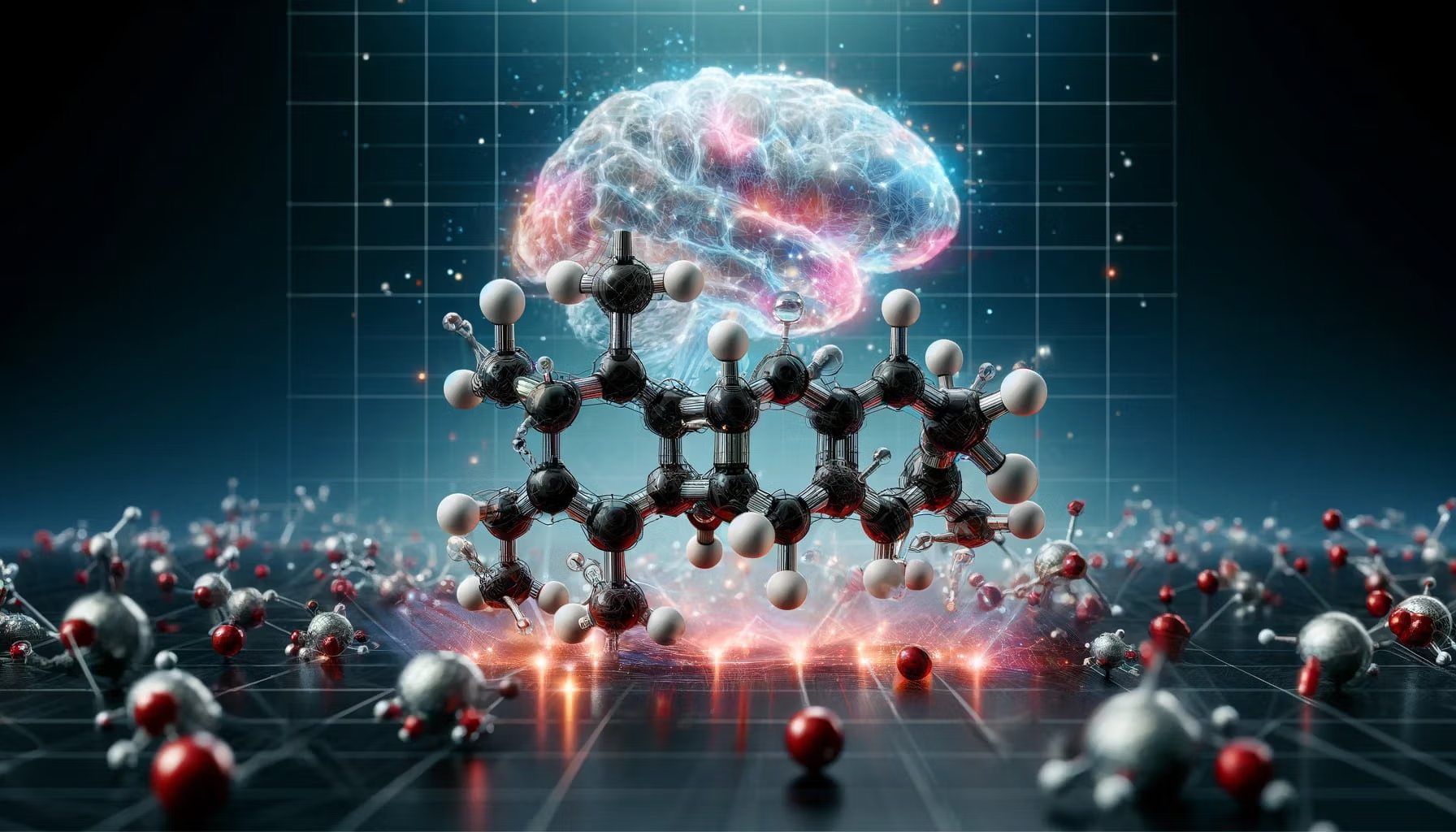
Over recent years, 5-HTP has gained popularity as a supplement for cognitive enhancement and overall well-being.
With a high bioavailability, 5-HTP offers a range of potential benefits, from alleviating symptoms of depression and insomnia to aiding in weight loss.
This comprehensive guide looks into the science behind 5-HTP, its production, optimal dosage, and potential side effects.
Table of Contents
What Is 5-HTP?

5-Hydroxytryptophan (5-HTP) is an amino acid. It is a precursor to serotonin, a neurotransmitter that regulates mood, sleep, appetite, and pain sensations.(1)
Structurally, 5-HTP consists of an indole ring, a carboxyl group, and an amino group.
Its molecular formula is C₁₁H₁₂N₂O₃, with a molar mass of 220.23 g/mol and a high bioavailability.
How Is 5-HTP Produced?
Naturally, 5-HTP is synthesized from tryptophan by the enzyme tryptophan hydroxylase in the brain and intestines.
For commercial purposes, 5-HTP is extracted from the seeds of Griffonia simplicifolia, an African shrub, or produced synthetically in laboratories.
What Are the Benefits and Uses of 5-HTP for Cognitive Enhancement?
5-HTP offers several cognitive benefits, primarily due to its role in increasing serotonin levels:
- Improved mood and reduced symptoms of depression
- Enhanced sleep quality and duration
- Increased feelings of calmness and relaxation
- Reduced anxiety and stress levels
- Potential appetite suppression and weight loss aid
How Does 5-HTP Help Alleviate Depression and Improve Mood?
5-HTP has been shown to alleviate symptoms of depression and improve overall mood by increasing serotonin levels. According to a study by Nakajima et al. (1978), 5-HTP administered at doses of 50-300 mg per day significantly reduced depression scores in 60% of participants after 2-4 weeks of treatment.
| Benefit | Mechanism |
|---|---|
| Mood improvement | Increased serotonin synthesis |
| Reduced depression symptoms | Enhanced serotonergic neurotransmission |
| Increased feelings of well-being | Modulation of serotonin receptors |
How Does 5-HTP Improve Sleep Quality and Treat Insomnia?
5-HTP can improve sleep quality and help treat insomnia by increasing serotonin levels, which are later converted to melatonin, the sleep-regulating hormone.
A study found that a combination of 5-HTP and GABA significantly reduced time to fall asleep, increased sleep duration, and improved sleep quality in 18 patients with sleep disorders.(2)
How Does 5-HTP Aid in Weight Loss and Appetite Suppression?
5-HTP may aid in weight loss and appetite suppression by increasing feelings of fullness and reducing cravings.
Ceci et al. (1989) demonstrated that obese women given 8 mg/kg of 5-HTP daily for 5 weeks experienced significant weight loss (average 3.3 kg) compared to placebo.(3)
The appetite-suppressing effects of 5-HTP are attributed to its influence on serotonin, which helps regulate hunger and satiety.

How Should 5-HTP Be Taken for Optimal Results?
5-HTP should be taken on an empty stomach, either 20 minutes before meals or 2 hours after meals.
This allows for maximum absorption and avoids potential interactions with other amino acids that could compete for absorption.
What Are the Recommended Dosages of 5-HTP for Different Uses?
The recommended dosages of 5-HTP vary depending on the intended use:
- Depression: 50-300 mg per day (divided into 3 doses)
- Insomnia: 100-300 mg (30-45 minutes before bedtime)
- Weight loss: 8 mg/kg of body weight (30 minutes before meals)
- Fibromyalgia: 100 mg (3-4 times per day)
- Migraines: 100-200 mg (2-3 times per day)
It’s essential to consult a healthcare professional to determine the appropriate dosage for individual needs and to monitor for potential side effects.
How Long Does It Take for 5-HTP to Start Working?
The time it takes for 5-HTP to start working varies depending on the individual and the intended use.
For mood and sleep improvements, effects may be noticeable within the first week of consistent use.
However, for conditions like depression and fibromyalgia, it may take 2-4 weeks of regular use to experience significant benefits.
Can 5-HTP Be Taken Long-Term for Sustained Benefits?
While 5-HTP is generally considered safe for short-term use (up to 12 weeks), long-term safety and efficacy have not been extensively studied, and thus is not recommended.
What Are the Potential Side Effects of 5-HTP?
The most common side effects of 5-HTP include:
- Nausea
- Diarrhea
- Stomach discomfort
- Headache
- Dizziness
- Fatigue
These side effects are generally mild and transient, often subsiding with continued use or dosage adjustment.
What Are the Serious and Severe Side Effects of 5-HTP?
In rare cases, 5-HTP may cause more severe side effects, such as:
- Serotonin syndrome (when combined with other serotonergic drugs)
- Allergic reactions (skin rash, itching, swelling)
- Muscle pain or weakness
- Irregular heartbeat
If any of these severe side effects occur, discontinue use and seek medical attention immediately.
Who Should Avoid Taking 5-HTP or Use Caution?
Certain individuals should avoid taking 5-HTP or use caution:
- Pregnant or breastfeeding women: insufficient safety data
- Children: lack of studies in pediatric populations
- People with liver or kidney disease: may affect metabolism and excretion
- Individuals taking antidepressants: risk of serotonin syndrome
- Those undergoing surgery: may interact with anesthesia; discontinue use at least 2 weeks prior
What Are the Potential Interactions of 5-HTP?
5-HTP may interact with several medications and supplements:
- Antidepressants (SSRIs, SNRIs, tricyclics, MAOIs): increased risk of serotonin syndrome
- Sedatives or sleep aids: enhanced sedative effects
- Carbidopa (Parkinson’s medication): reduced effectiveness of 5-HTP
- Tramadol (pain medication): increased risk of serotonin syndrome
- Dextromethorphan (cough suppressant): increased risk of serotonin syndrome
- St. John’s Wort, SAMe, Tryptophan: additive serotonergic effects, increased risk of side effects
Always consult a healthcare professional before combining 5-HTP with any medications or supplements to avoid potentially dangerous interactions.

Where Can I Buy High-Quality 5-HTP Supplements?
High-quality 5-HTP supplements can be purchased from reputable health food stores, vitamin shops, and online retailers.
What Should I Look for When Buying 5-HTP Supplements?
When purchasing 5-HTP supplements, consider the following factors:
- Purity: Choose products with minimal fillers, additives, or artificial ingredients.
- Potency: Ensure the product contains the claimed amount of 5-HTP per serving.
- Third-party testing: Look for supplements that have been independently tested for quality and purity.
- Reputation: Buy from reputable brands with a history of producing high-quality supplements.
- Extraction source: Opt for 5-HTP derived from Griffonia simplicifolia seeds, as this is the most studied and safest form.
How Should 5-HTP Supplements Be Stored for Maximum Potency?
To maintain maximum potency, store 5-HTP supplements in a cool, dry place away from direct sunlight and moisture.
Most supplements are shelf-stable at room temperature, but some may require refrigeration after opening.
Always follow the manufacturer’s storage instructions and discard any supplements that have passed their expiration date.
What Are the Alternatives to 5-HTP for Cognitive Enhancement?
Several alternatives to 5-HTP exist for cognitive enhancement, mood support, and sleep improvement:
- L-Tryptophan: the essential amino acid precursor to 5-HTP and serotonin
- St. John’s Wort: an herb known for its mood-enhancing and antidepressant properties
- SAM-e (S-Adenosyl methionine): a naturally occurring compound involved in serotonin synthesis
- Omega-3 fatty acids (EPA and DHA): essential fats that support brain health and mood regulation
- B-complex vitamins: crucial for neurotransmitter synthesis and overall brain function
- Adaptogens (e.g., ashwagandha, rhodiola): herbs that help the body cope with stress and promote mental well-being
How Do the Alternatives Compare to 5-HTP in Terms of Effectiveness and Safety?
The effectiveness and safety of 5-HTP alternatives vary:
- L-Tryptophan: Comparable effectiveness to 5-HTP, but with a slower onset of action. Generally well-tolerated, but may cause drowsiness and gastrointestinal discomfort.
- St. John’s Wort: Proven effectiveness for mild to moderate depression, but may interact with many medications and cause side effects such as dry mouth, dizziness, and photosensitivity.
- SAM-e: Shown to be as effective as tricyclic antidepressants for depression, with fewer side effects. However, it may cause nausea, diarrhea, and insomnia in some individuals.
- Omega-3 fatty acids: Moderate effectiveness for mood support and brain health. Generally safe, but may cause digestive issues or fishy aftertaste.
- B-complex vitamins: Essential for overall brain function, but may not provide targeted benefits like 5-HTP. Generally well-tolerated, but high doses may cause nerve damage.
- Adaptogens: Varying effectiveness for stress reduction and mental well-being. Generally safe, but may interact with some medications and cause side effects like digestive discomfort or headache.
As with 5-HTP, it’s crucial to consult a healthcare professional before starting any new supplement regimen to ensure safety and appropriate use based on individual needs and health status.
- Birdsall, T C. “5-Hydroxytryptophan: a clinically-effective serotonin precursor.” Alternative medicine review : a journal of clinical therapeutic vol. 3,4 (1998): 271-80.↩
- Shell, William et al. “A randomized, placebo-controlled trial of an amino acid preparation on timing and quality of sleep.” American journal of therapeutics vol. 17,2 (2010): 133-9. doi:10.1097/MJT.0b013e31819e9eab↩
- Ceci, F et al. “The effects of oral 5-hydroxytryptophan administration on feeding behavior in obese adult female subjects.” Journal of neural transmission vol. 76,2 (1989): 109-17. doi:10.1007/BF01578751↩

